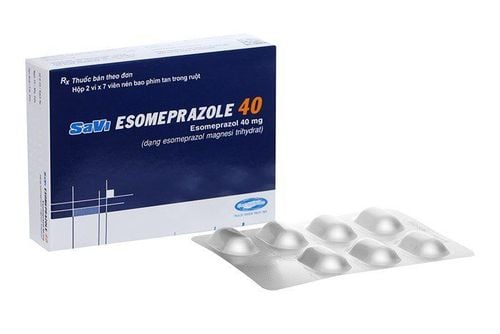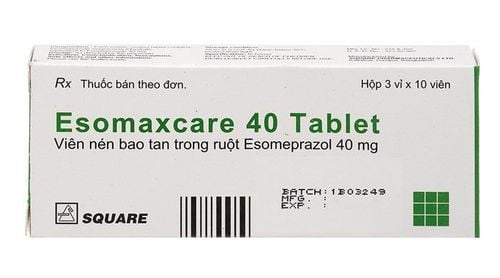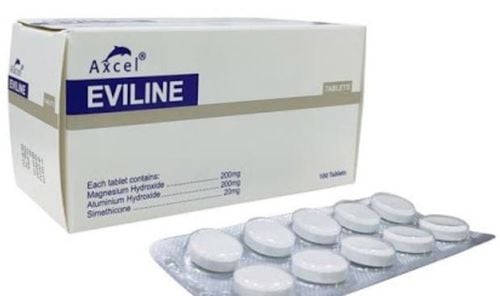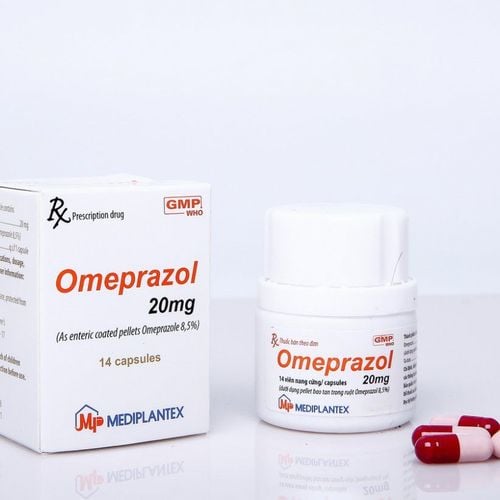This is an automatically translated article.
Pantocid 40mg contains the main active ingredient is Pantoprazol, used for peptic ulcer, Zollinger - Ellison syndrome, gastroesophageal reflux and other pathological hypersecretory conditions. The drug is prepared in the form of a powder for injection, the content of 40mg.
1. Indications and contraindications for taking Pantocid 40mg
Pantocid IV 40 mg is indicated for use in the following cases:
Gastroesophageal reflux disease; Peptic ulcer ; Zollinger-Ellison syndrome and other pathological hypersecretory conditions. Pantocid 40 mg is contraindicated in cases of allergy, hypersensitivity to Pantoprazol or any of its ingredients.
2. How to take Pantocid IV 40mg
How to use Pantocid IV 40mg:
Mix Pantocid 40mg vial with 10ml of 0.9% NaCl solution. This mixture must be used within 12 hours, can be administered intravenously directly or diluted with 100ml of infusion. The infusion fluid may be 0.9% NaCl, Ringer lactate or 5% Dextrose. The solution after dilution may have a precipitate, although it does not change the quality of the drug, but must be passed through the filter of the infusion line, separately from other injection solutions. Dosage of Pantocid:
Pantocid 40mg drug is injected directly intravenously slowly over at least 2 minutes or intravenously when the disease is severe, mainly in gastric and duodenal ulcers that are bleeding. Use Pantocid 40mg only when it is not suitable for oral use. According to research, it should only be used intravenously for a maximum of 7 days. Discontinue treatment with Pantocid IV 40mg as soon as oral therapy is possible. Gastric - duodenal ulcer, gastroesophageal reflux: Intravenous dose of 40mg vial per day, injected directly for at least 2 minutes or intravenously over 15 minutes. Children under 12 years of age: Because the safety of Pantoprazol has not been fully determined, the drug is not recommended for use in this population. Patients with severe hepatic impairment: Do not exceed a dose of 20mg/day (ie half-filter of Pantocid 40mg). Patients with renal impairment, the elderly: No dose adjustment is required.
3. Undesirable effects of Pantocid IV 40mg
Pantoprazole is generally well tolerated even with treatment. When using Pantocid 40 mg, you may experience the following undesirable effects:
Body as a whole: Fatigue, weakness, dizziness, headache. Thrombophlebitis at the injection site. Rare: malaise, peripheral edema, anaphylaxis. Neurological: Tinnitus, confusion, hallucinations, somnolence, agitation or depression. Skin: Skin rash, urticaria, pruritus, angioedema. More rarely, exfoliative dermatitis, erythema multiforme. Gastrointestinal: Dry mouth, nausea, vomiting, flatulence, abdominal pain, constipation, diarrhea. Increased liver enzymes, increased Bilirubin. Blood: May experience eosinophilia, leukopenia, thrombocytopenia. Musculoskeletal: Muscle pain, joint pain. Some other side effects: Increased triglycerides, impotence in men, hyponatremia.
4. Use caution
Before taking Pantoprazol or other proton pump inhibitors, the possibility of gastric or esophageal cancer should be excluded because the drug may mask symptoms and delay the diagnosis of cancer. In the presence of any serious symptoms such as weight loss, repeated vomiting, dysphagia, hematemesis, anemia, malignancy should be excluded. If symptoms persist despite adequate treatment, further examination is needed to rule out malignancy. Pantocid is a proton pump inhibitor (PPI). Drugs that reduce stomach acidity can increase the number of bacteria in the digestive tract, increasing the risk of gastrointestinal infections caused by bacteria such as Salmonella, Campylobacter.
Severe liver failure requires reducing the dose of Pantocid or taking it every other day. The maximum intravenous dose is 20mg/day or 40mg once a day. It is necessary to monitor liver enzymes while taking the drug, if the enzyme increases, treatment should be stopped.
Patients with renal impairment have no change in the pharmacokinetics of the drug. No dose adjustment is recommended in patients with impaired renal function, but a maximum dose of 40 mg is recommended.
Undesirable effects of the drug such as dizziness, visual disturbances may occur. If these symptoms occur, the patient should not drive or operate machinery.
Currently there are no adequate studies of the use of the drug in pregnant women, so it should only be used when clearly needed. Pantoprazole may be excreted in human milk, consideration should be given to discontinuing nursing or discontinuing the drug in the mother.
5. Drug interactions
Pantoprazole is metabolised in the liver by the cytochrome P450 enzyme system. It is not excluded that Pantocid may interact with other substances that are also metabolized through this same enzyme system. However, studies did not find any clinically significant interactions between Pantoprazol and drugs such as Carbamazepine, Diazepam, Phenytoin, Piroxicam, Theophylline, Diclofenac, Digoxin, Ethanol, Caffeine, Glibenclamid, Metoprolol, Naproxen, Nifedipine, or contraceptives. contains Levonorgestrel and Ethinyl oestradiol.Interaction studies have also been performed when Pantoprazol is co-administered with corresponding antibiotics (Clarithromycin, Metronidazole, Amoxicillin). No clinically relevant interactions were found.
Similar to other proton pump inhibitors, Pantocid can reduce the absorption of drugs whose absorption is dependent on gastric pH such as Itraconazole, Ketoconazole.
Although no drug interactions with concomitant Warfarin or Phenprocoumon were observed in clinical pharmacokinetic studies. In particular, cases of altered INR have been reported. Patients treated with Coumarin anticoagulants (eg, Phenprocoumon or Warfarin), should monitor prothrombin time/INR when starting, stopping, or during occasional pantoprazol use.
Concomitant administration of high doses of methotrexate (eg, 300 mg) and PPIs have been reported to increase methotrexate concentrations in some patients. Therefore, when high doses of methotrexate are used in certain patients, such as cancer and psoriasis, temporary discontinuation of pantoprazole may be considered.
In summary, Pantocid 40mg is indicated in cases of peptic ulcer, Zollinger-Ellison syndrome, gastroesophageal reflux and other pathological hypersecretory conditions. Patients need to take the drug exactly as prescribed by the doctor to increase the effectiveness of treatment and ensure safety for health.
Please dial HOTLINE for more information or register for an appointment HERE. Download MyVinmec app to make appointments faster and to manage your bookings easily.













